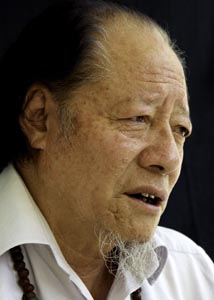Name: Tehor Phuntsok
(Alias: No)
Gender: Male
Interview Age: 75
Date of Birth: 1937
Birthplace: Tehor, Kham, Tibet
Year Left Tibet: 1960
Profession: Farming, Herding
Monk/Nun: No
Political Prisoner: No

Interview No.: 55D
Date: 2012-05-17
Language: Tibetan
Location: Bir, Bir, Himachal Pradesh, India
Categories: Resistance and Revolution
Keywords: childhood memories, Chinese -- first appearance of, Chinese army -- invasion by , escape experiences, imprisonment, Kham, refugee in India -- life as, resistance fighters
Summary:
Tehor Phunsok was born in Tehor in the Tiwu region of Kham Province. Tehor Phunsok's father served as a group leader, overseeing 50-70 families. Two large monasteries, Minyak Gonpa and Jora Gonpa, were the center of people's lives and he recounts the revered reincarnated lamas.
Tehor Phunsok relates his first experience the Chinese, who initially lured the Tibetans with candies, cigarettes and assistance. They took leaders from throughout Tibet on a tour of China to win their support, but the leader from Tehor Phunsok's region remained distrustful. The Chinese began their "liberation" process, declaring that no changes would be implemented for monasteries and nomads, but the farmers must give up their weapons and possessions.
The people of Tehor Phunsok's region attempted to resist the Chinese in 1956, but were defeated. Many were arrested and others including Tehor Phunsok fled into the forest to hide, but were soon coerced to return after the wives and children were threatened. His father was arrested, but Tehor Phunsok was able to join a larger resistance movement in Golok Serta. After a few years of fighting battles, the Tibetans were finally surrounded by the Chinese troops. A few hundred escaped and battles continued as they journeyed towards Lhasa. Tehor Phunsok was shot three times. When they learned that the Dalia Lama had fled to India, the resistance fighters changed their plan and headed to Mustang and then to India.
Interview Team:
- Marcella Adamski (Interviewer)
- Thupten Kelsang Dakpa (Interpreter)
- Pema Tashi (Videographer)

